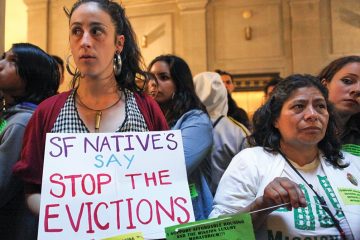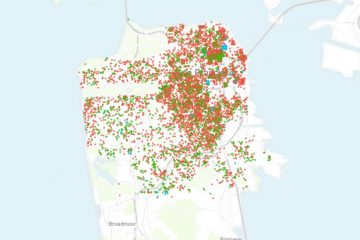How Prop 10 Would Help Resolve the Housing Crisis
Ask a Tenant Attorney is your chance to learn how to survive as a tenant in San Francisco. Each month Tenant’s Rights Attorney Daniel Wayne addresses a different issue for residential tenants. In this edition we discuss why it is crucial to vote YES on Prop 10 on November 6. For more information about Daniel and his firm, Wolford Wayne LLP, check out his website at www.wolford-wayne.com. Have a suggestion for a landlord-tenant issue you want Daniel to address in the column? Send an email to alex@brokeassstuart.com and we will pass it along!
Proposition 10, or, the Affordable Housing Act, is on California’s state ballot this November 6. This is hands down the most important piece of legislation affecting tenants in years. A yes vote repeals the Costa Hawkins Rental Housing Act, a bad, landlord-friendly law that severely limits the reach of rent control.
What is Costa Hawkins
The Costa-Hawkins Rental Housing Act is a California state law enacted in 1995 and supported heavily by landlords and real estate developers. Costa Hawkins limits the ability of cities and counties to enact their own rent control laws and took a lot of the teeth out of those rent control laws established in the 1970s and 1980s.
In particular Costa Hawkins has three primary effects:
- It precludes all buildings built after 1995 from rent control.
- It exempts all single-family homes and condominiums from rent control.
- It allows landlords to raise rents to market rate whenever a tenant dies, moves out, or is evicted from a unit. (This is known as “vacancy de-control.”). And, prevents cities from making their own rules on this.
Why is Costa Hawkins Bad?
Costa Hawkins is bad for several reasons. First, it places an arbitrary limitations on the reach of rent control. As a matter of law, Costa Hawkins prevents cities like San Francisco and Oakland from protecting tenants living in single family homes, condos and new construction from rent control. That leaves tenants vulnerable to the changes in the rental market. It also means that as housing stock gets replaced, the amount of homes protected by rent control will continue to shrink, making cities more and more unaffordable.
Perhaps worse, Costa Hawkins prevents cities from enacting “strict” rent control. Landlords can raise rents whenever the last “original occupant” vacates. That means that landlords have a strong incentive to get rid of long-term tenants. Once that tenant moves out, they can jack up rents to market rate. Without Costa Hawkins, cities could pass common sense laws to cap the amount rents can be raised when an original occupant moves out.
Finally, Costa Hawkins is one size fits all. California is huge and diverse and what makes sense for one city may not make sense for another. Costa Hawkins applies to cities across the state and limits individual cities from addressing their own housing issues head on.
What is Prop 10?
If passed, Prop 10 repeals the Costa-Hawkins Rental Housing Act. Currently California has the highest poverty rate in the country. This is in large part due to the high cost of housing. In California over one third of renters spend over 50% of their income on rent. Meanwhile developers and landlords are making record profits. If Prop 10 passes, it will roll back the limitations Costa Hawkins places on rent control, which would be huge for the rights of tenants and help cities address the housing crisis.
Prop 10 would have a tremendous impact on resolving the housing crisis in California. Among the changes it would have:
- Condos and single-family homes would no longer be exempt from rent control
- Cities could expand rent control to apply to new construction
- Allow cities to implement “vacancy control” which would dis-incentivize landlords from forcing long term tenants out of their homes.
What About those Ads Claiming Prop 10 Hurts Seniors and Veterans?
These ads are very misleading. The “No on 10” crowd has been pushing a narrative that Prop 10 does not contain protections for veterans or seniors. This is pretty offensive. The only logical explanation for this claim is that it doesn’t include any carve outs for landlords that are seniors or veterans. Which is true. Because that is not what this law is about. If you are a senior or a veteran you still get to be a landlord, and you still get to collect rent. You just won’t be able to raise a tenant’s rent 1000% on 60 day’s notice if they live in a condo.
That said, if you are a senior or a veteran and a TENANT, this law helps you big time. These folks will potentially have more protections from outrageous rent increases and eviction threats.
Vote Yes on Prop 10 for real rent control
Prop 10 is a game changer for tenants. It won’t mean landlords won’t be able to make money, and it won’t mean that little old lady in the No on 10 ads you are seeing will lose their home. It will help level the playing field for tenants and should go a long ways towards solving our current housing crises. If you’d like to get involved in the Yes on 10 campaign to support Californians’ right to rent control, start at voteyesonprop10.org










